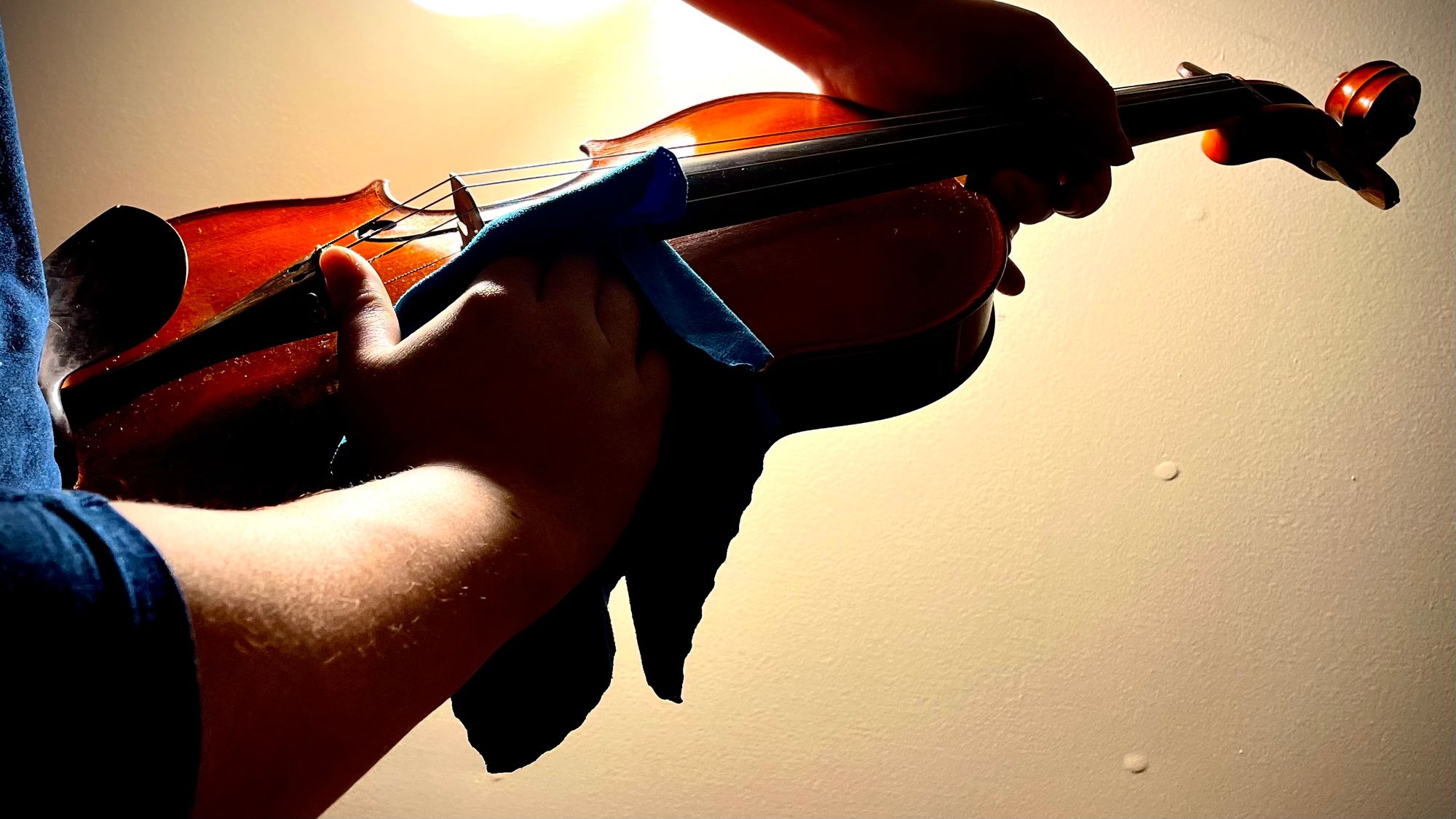Stringed Instrument Care
Aside from learning how to play our instruments, it is also crucial to know how to maintain and care for our musical companions.
Aside from learning how to play our instruments, it is also crucial to know how to maintain and care for our musical companions. You’ll be less likely to need to visit a luthier for repairs, and can spare your wallet from costly bills with the proper knowledge.

Cleaning the Body of Your Instrument
Be sure to wipe down your instrument often, especially after a long practice session or when you notice a residual buildup of rosin. Having a layer of rosin stuck to the top of your instrument for a long time not only looks unpleasant, but will be harder to remove when you try to clean your instrument later.
Never use water to clean your instrument! Because your instrument is made of wood, using water can damage the physical components and can also cause metal parts to rust. NEVER USE ALCOHOL on the body of your instrument! Just one drop— before you can even react to wipe away the mistake— will cause it to strip away the varnish on your instrument. Polish made especially for cleaning the instrument does exist, but it is best advised to leave cleaning to a luthier as some instruments have varnish coatings that can be stripped away by certain polish formulas if not careful.
When wiping down the instrument, make sure to wipe down the strings and fingerboard too! You can do this by threading your cleaning cloth in between the strings and fingerboard. Cleaning your strings and wiping away the rosin buildup and sweat may allow your strings to last longer. Not cleaning your strings will cause them to oxidize or even rust over time. You'll notice this by the color of the strings and if you're wiping them once in a blue moon, you’ll see black or brown streaks on your cleaning cloth or maybe even on the tips of your fingers after practicing! (Although, depending on the quality of your instrument, this can sometimes be due in part to some of the color coming off your fingerboard depending on the quality.) Strings can begin to oxidize very quickly in a matter of days depending on the humidity and how much your hands sweat.
Other Important Smaller Components
Bridge
Make sure to check your bridge every so often, especially when you have a great deal of tuning with your pegs. You want to be sure that your bridge forms a 90-degree angle with the body of your violin. This way, it prevents warping of the bridge. A warped bridge can snap in half or simply fly out from underneath the strings, which can be absolutely terrifying!
Peg Wax/Peg Compound
Have you ever found it difficult to tune using your pegs because they slip a great deal? Or they’ve become too sticky to turn and you have a hard time getting it to the right tuning? It’s likely that you may need to put some peg wax or peg compound on the part of the pegs where they turn in the peg-hole for them to turn smoothly. On the other hand, slippery pegs can sometimes mean you have too much peg compound applied which you can also solve by wiping it away or using a little bit of rosin dust for it to stick better. Lastly, it could be that your pegs are slightly smaller than the peg hole. Poorly fitted pegs require you to take your instrument into a shop and have it checked by a luthier, if possible.
Accessories
Aside from our instruments, we should also take care of our accessories too! Be sure to keep your spare strings and rosin in a cool dry place. Humid air can cause fresh strings to rust, while rosin can melt in the heat. Unless you’re intentionally trying to reshape your shattered rosin, try to keep it in a cool place.
Our bows are also just as important as the instrument. Afterall, bows are what draws sound from our strings! Be sure you’re loosening the bow hair when retiring it back to the case after every practice session. This way, you don’t lose the elasticity in your bow hair and stick over time. Our bow sticks have a natural flexibility and have been bent to their unique shape in the process of production. Leaving your bow hair tightened for a long time while not in use causes the bow to lose its flexibility or warp and may require a luthier to recamber it.
Environment
Temperature and humidity— weather overall— can affect our instruments dramatically. Avoid exposing your instrument to sudden changes in extreme temperatures or humidity levels, as this could result in cracking or open seams. Being mindful of the atmospheric conditions and adapting to the weather changes for your instrument can save you an expensive repair bill later. In dry conditions, it is recommended to have a case humidifier or a Dampit for your instrument, as very dry levels can lead to cracking and open seams.
Do not leave your instrument under direct sunlight. Just like you wouldn’t want to sit in direct sunlight for a prolonged period of time (and possibly end up with a sunburn!), the same goes for our instrument. Exposure to heat can melt the varnish on your instrument. The same goes for any source of heat, whether it be a heater or backstage dressing room light bulbs, to even stage lights if in very close proximity.
Finally, as string players we want to be aware of our surroundings, know the fundamental care required for our instruments so we can have a long-lasting and enjoyable time with our musical companions. After reading this, hopefully you’ll have found an interesting fact or even know how to take better care of your instrument! Consider this a refresher and a friendly reminder to go wipe some of that white cakey rosin buildup you left behind earlier. 😉
